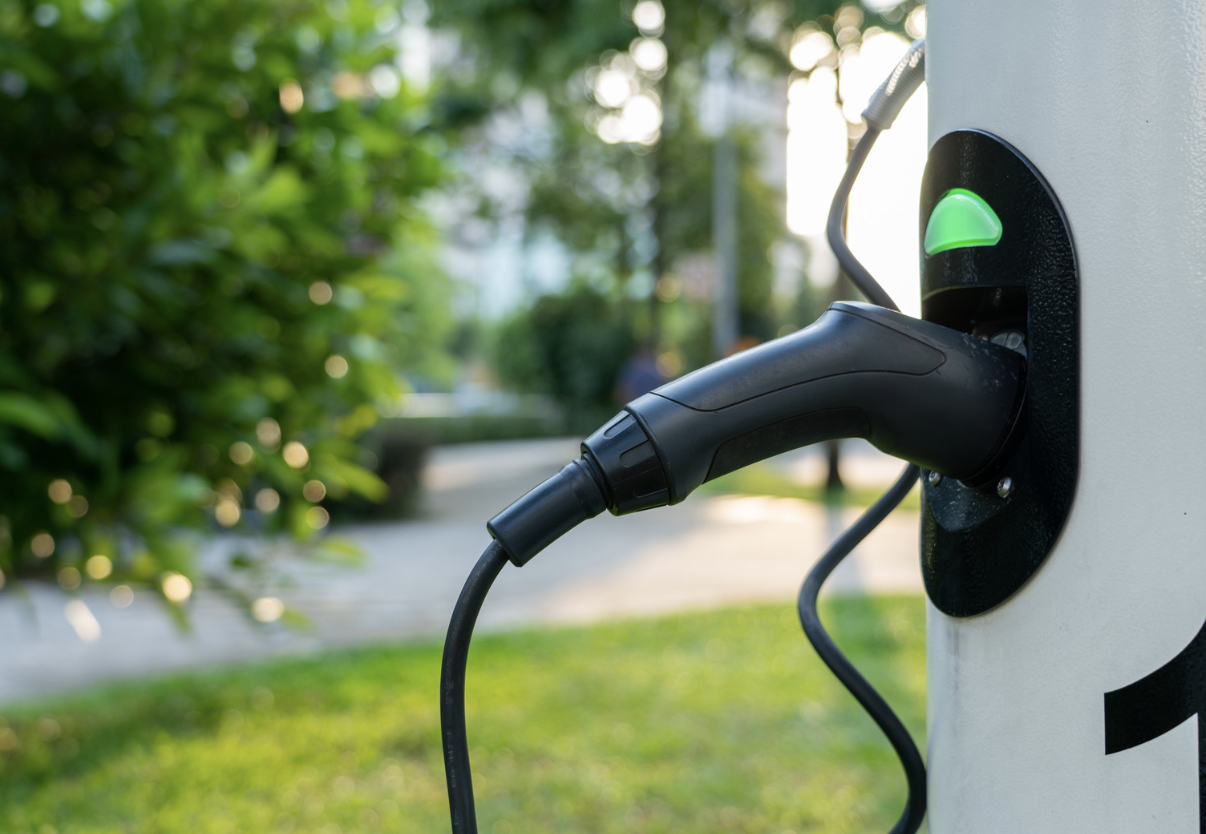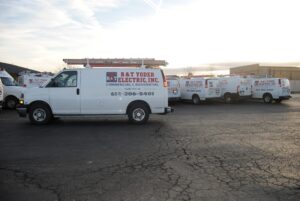
As electric vehicles (EVs) gain popularity, the demand for reliable EV charging stations is rising rapidly. Whether you’re an EV owner considering a home installation or a business looking to provide charging options for customers, understanding the differences between residential and commercial EV charging stations is essential. Each type of installation comes with unique requirements, benefits, and challenges. This guide compares residential vs. commercial EV charging stations, providing insights to help you choose the right setup for your needs.
Overview of EV Charging Levels
Before diving into the differences between home and commercial installations, it’s helpful to understand the different levels of EV charging stations:
- Level 1: Uses a standard 120V outlet, providing a slow charging rate (3-5 miles of range per hour). Often used for home charging, Level 1 is a basic but reliable option for daily commutes.
- Level 2: Requires a 240V outlet, offering a faster charge (10-30 miles of range per hour). Level 2 stations are suitable for both residential and commercial installations, providing a balance of speed and affordability.
- Level 3 (DC Fast Charging): This option provides the fastest charging speed (up to 100+ miles of range per hour) and is ideal for commercial installations due to the high cost and power requirements. DC fast chargers are often installed at public charging stations and highway rest stops.
Key Differences: Residential vs. Commercial EV Charging Stations
1. Purpose and Usage
Residential EV Charging Stations
Home EV charging stations are designed to meet the needs of individual EV owners. Typically, Level 1 or Level 2 chargers are installed to provide overnight charging, ensuring the vehicle has a full battery each morning. Convenience and cost-effectiveness are primary factors for residential installations.
Commercial EV Charging Stations
Commercial charging stations are meant to accommodate multiple users, such as customers or employees, and are usually designed to handle higher usage demands. Businesses often install Level 2 or DC fast chargers to provide quicker charging for users on a schedule. Commercial installations prioritize speed, user accessibility, and scalability.
2. Installation Requirements
Home Installation
Residential installations are generally straightforward. Most homes can accommodate a Level 1 charger with a standard 120V outlet, while a Level 2 charger requires a 240V outlet, which may involve minor electrical upgrades. The installation process usually involves finding a convenient location, like a garage or driveway, and ensuring the electrical panel can handle the charger’s capacity.
Commercial Installation
Commercial installations are more complex and may require significant infrastructure upgrades. A commercial EV charging station typically needs multiple charging points, which requires additional electrical capacity and sometimes dedicated transformers. Commercial locations, such as parking lots or shopping centers, also need to consider accessibility, signage, and parking configurations to accommodate several EVs simultaneously.
3. Power Capacity and Speed
Residential Charging Power
Home charging stations usually operate at 16-32 amps for Level 2 chargers, providing a charging speed of 10-30 miles of range per hour. This power level is ideal for overnight charging, allowing the EV owner to start each day with a full battery. Residential setups don’t require the rapid charging speeds needed for short-term use, as EV owners have the flexibility to charge their vehicles overnight.
Commercial Charging Power
Commercial EV charging stations often use high-powered Level 2 chargers (40-80 amps) or DC fast chargers, delivering up to 100 miles of range per hour. This increased power output is essential in commercial settings, where drivers expect faster charging times to minimize wait times and allow for a quick turnaround. Businesses often choose charging options that align with user expectations and the business’s operational goals.
4. Cost of Installation
Home Installation Costs
Residential EV charging stations are generally less expensive to install. A basic Level 1 charger costs very little if an outlet is already available, while Level 2 chargers, including installation, typically range from $500 to $2,000, depending on the home’s electrical capacity. Home installations don’t usually require infrastructure upgrades beyond a new 240V outlet.
Commercial Installation Costs
Commercial EV charging stations require a larger investment, as they typically involve multiple chargers, higher power requirements, and additional electrical infrastructure. Level 2 commercial chargers can cost between $2,000 and $5,000 per unit, while DC fast chargers may range from $20,000 to $50,000 each, depending on the model and power capacity. Businesses may also incur extra costs for site preparation, permitting, signage, and ongoing maintenance.
5. Maintenance and Management
Home Maintenance
Maintenance for residential EV charging stations is minimal, as they generally serve only one user and experience less wear and tear. Routine inspections and occasional cleaning are usually sufficient to keep the unit in good condition. Some Level 2 home chargers offer remote monitoring and troubleshooting features, making maintenance convenient for homeowners.
Commercial Maintenance
Commercial EV chargers require regular maintenance and inspections to ensure continuous operation for multiple users. Given the higher usage, commercial units are more likely to experience wear and tear, which can lead to malfunctions if not regularly serviced. Businesses may choose to work with maintenance providers or subscribe to maintenance plans that cover repairs and monitoring.
Choosing the Right EV Charging Station for Your Needs
For Homeowners
- Daily Commuters: If you primarily drive short distances daily, a Level 1 charger may be sufficient. It provides a slower charge but is affordable and easy to set up.
- Regular Long-Distance Drivers: For drivers who frequently commute longer distances, a Level 2 charger is a better choice. The faster charging speed ensures your vehicle is ready each morning.
- Budget Considerations: Level 2 chargers may involve an upfront cost, but the convenience of overnight charging often outweighs the expense. Rebates or tax incentives may be available to help offset costs.
For Businesses
- Customer and Employee Convenience: Level 2 chargers provide quick enough charging for users who spend a few hours at your location. If you’re a retail business or workplace, Level 2 chargers offer a balance between speed and affordability.
- High-Traffic Areas: DC fast chargers are ideal for locations with a high volume of EV drivers, such as shopping centers, rest stops, or urban parking lots. These chargers allow users to get a significant charge in a short period, maximizing turnover.
- Return on Investment: Installing EV chargers can be a profitable addition for businesses, especially those in high-traffic areas. Offering fast, accessible charging attracts EV drivers, potentially increasing foot traffic and customer loyalty.
Environmental Impact and Sustainability
Residential EV Charging
Charging an EV at home is generally more sustainable than relying on public charging, as homeowners can control their electricity source. By using renewable energy sources, such as solar panels, homeowners can reduce their carbon footprint, making EV charging more eco-friendly.
Commercial EV Charging
Commercial EV stations contribute to sustainability by encouraging widespread EV adoption. Businesses committed to sustainability can power their stations with renewable energy sources or offer green charging options, promoting environmentally conscious practices among their customers and employees.
Incentives and Rebates for EV Charging Station Installation
Both residential and commercial EV charging installations may be eligible for incentives, rebates, or tax credits that help offset the installation costs. Programs vary by location, so it’s essential to check with local utility providers, state programs, and federal incentives.
- Residential Incentives: Many states and local governments offer rebates for installing home EV chargers. Federal tax credits may also apply, covering up to a certain percentage of the installation costs.
- Commercial Incentives: For businesses, utility companies and government programs often provide grants or rebates for commercial EV installations. These incentives can significantly reduce the cost of installing Level 2 or DC fast chargers, making it a more accessible option for businesses.
Installation Process: Residential vs. Commercial EV Charging
Residential Installation
- Site Assessment: The first step is assessing the site to ensure electrical capacity meets the requirements of the EV charger. An electrician checks the existing electrical panel and determines if a 240V outlet can be installed.
- Permitting: Some jurisdictions may require permits for Level 2 charger installations, depending on local regulations.
- Installation: An electrician installs the charger, typically in the garage or driveway, and connects it to the electrical panel. Once installed, the homeowner can plug in and begin charging immediately.
Commercial Installation
- Site Planning: For commercial setups, planning includes identifying the optimal location for chargers, configuring parking spaces, and ensuring accessibility.
- Upgrades and Permitting: Commercial installations often require substantial upgrades to electrical infrastructure, such as dedicated transformers or high-capacity electrical panels. Businesses must also obtain the necessary permits and approvals.
- Installation and Testing: The installation involves setting up multiple chargers, signage, and customer access points. Testing ensures that chargers are functional and meet usage and safety standards.
- Monitoring and Management: Commercial stations often include networked chargers that allow for remote monitoring, tracking usage, and managing billing. Businesses may also choose to offer paid charging services for added revenue.
Conclusion: Choosing the Right EV Charging Station for Your Needs
Whether installing a residential or commercial EV charging station, understanding your specific requirements is essential. Home installations offer convenience and cost-effectiveness for daily charging needs, while commercial setups provide high-powered charging solutions to attract EV users and accommodate multiple vehicles. Working with a qualified electrician ensures that installations meet safety and code requirements, providing reliable, efficient charging for all users.
FAQs
What’s the difference between residential and commercial EV charging stations?
Residential chargers typically serve one user with Level 1 or Level 2 charging, while commercial chargers support multiple users with higher-powered Level 2 or DC fast charging options.
How much does it cost to install a home EV charging station?
Home installations range from $500 to $2,000 for a Level 2 charger, depending on the home’s electrical capacity and installation requirements.
Are commercial EV charging stations profitable?
Yes, businesses can generate revenue by offering paid charging services, especially in high-traffic areas. EV chargers also attract more customers, increasing foot traffic.
What type of EV charger is best for a business?
For retail locations or workplaces, Level 2 chargers are ideal. For high-traffic or highway locations, DC fast chargers offer faster turnaround and attract more drivers.
Can I install a residential EV charger myself?
Level 1 chargers can plug into standard outlets, but a licensed electrician should install Level 2 chargers to ensure safety and code compliance.







